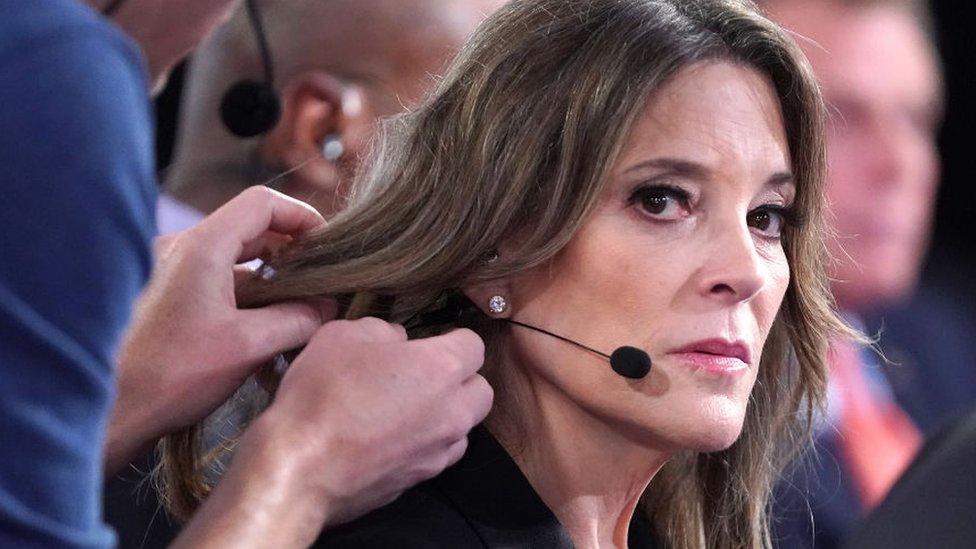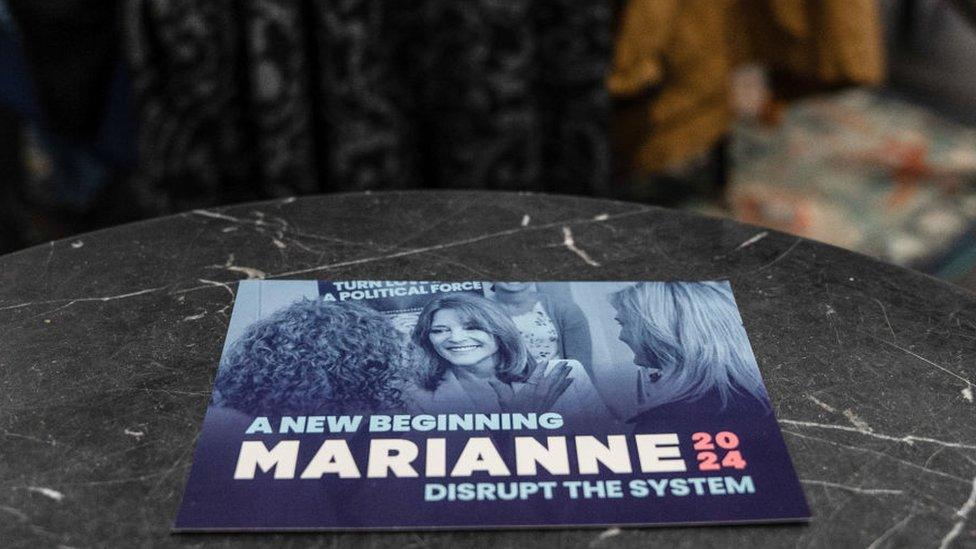Marianne Williamson responds to Politico article alleging abuse toward staff
- Published

Marianne Williamson told the BBC's Americast she is not running for "sainthood"
2024 Democratic presidential candidate Marianne Williamson has responded to allegations that she was verbally and emotionally abusive toward staff during her White House campaign four years ago.
Warning: This article contains language that some readers may find offensive
Speaking with the BBC's Americast podcast on Thursday, Ms Williamson called a Politico Magazine article, external reporting the accounts of 12 anonymous former staffers a "hit piece" and a "distraction technique".
She also dismissed what one of the interviewees described as her episodes of "foaming, spitting, uncontrollable rage".
"If I can be a bitch at the office at times, I don't think anybody's happy about that," she said, "but I think anybody reading that can measure that against what is normal in politics."
"I'm not running for sainthood here," she continued. "I'm running for president."
The Politico article alleged Ms Williamson threw a phone at an aide, criticised the physical appearance of staff, and repeatedly hit a car door so hard that her hand required medical attention.
In the article, she is quoted as denying ever criticising anyone for their weight and, whilst admitting the car door incident, said she would never physically hurt a person.
During the Americast interview, the popular self-help and spiritual guru who is in her third run for public office, also called the phone allegation "categorically untrue".
But she acknowledged she may have room for personal growth.
"If I've been a tough boss lady, if I have some lessons to learn, which obviously maybe I do, then I hope that I will learn them," she said.
Although the Politico story largely relied on anonymous sources, the magazine included excerpts from a 2019 resignation letter sent by her Iowa state director, Roger Becker, criticising what he called the "belittling, abusive, dehumanizing and unacceptable" way she treated her staff.
In addition, Politico contacted her former New Hampshire state director, ex-Congressman Paul Hodes, who said that Ms Williamson's alleged behaviour was "consistent" with what he had seen and heard while working with her.
"Paul's trying to make his way back into some perch in the Democratic establishment," Ms Williamson told Americast when asked for a response. "It's so obvious to anyone on the inside. God bless, Paul Hodes.
"I hope he finds a way to find peace in his heart and build his career back up in some other way than tearing somebody else's down."

Marianne Williamson's 2024 campaign promises to "disrupt the system"
Ms Williamson announced that she would seek the 2024 Democratic presidential nomination two weeks ago.
She is currently the only officially declared candidate, although US President Joe Biden is widely expected to launch his re-election campaign sometime in the coming months.
He holds a massive lead over Ms Williamson in the few Democratic voter preference surveys that have been released.
While Ms Williamson's 2020 campaign focused on what she saw as the need for spiritual healing in the US after the Donald Trump presidency, her 2024 campaign has a sharper, more populist edge.
Like democratic socialist Bernie Sanders, who finished second behind Mr Biden in 2020, Ms Williamson has denounced corporate and political elite that she says profits at the expense of less fortunate Americans.
She supports universal government-run healthcare, free childcare and public education, and at least $1tn (£825bn) in government slavery reparations to black Americans.
Ms Williamson qualified for the first two Democratic presidential debates in 2019.
This year, however, the Democratic National Committee is unlikely to officially sanction any 2024 debates, depriving Ms Williamson of perhaps the highest-profile platform to reach the party's voters.
This week's episode of the BBC's Americast is available on BBC Sounds or wherever you get your podcasts.
Related topics
- Published28 February 2023
- Published16 February 2023
